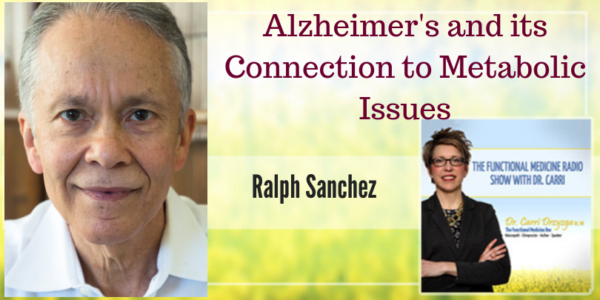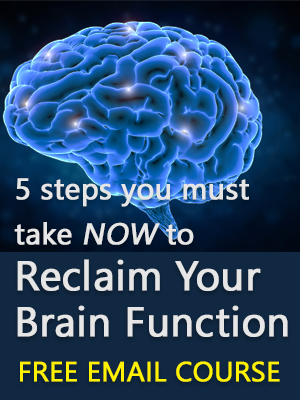Podcast: Play in new window | Download
Subscribe: Apple Podcasts | Android | RSS
In this episode of The Functional Medicine Radio Show, Dr. Carri’s special guest Ralph Sanchez explains the connection between Alzheimer’s disease and diabetes and other metabolic issues.
Ralph Sanchez is the author of the upcoming book – The Diabetic Brain in Alzheimer’s Disease – a book that connects the dots between Type 2 Diabetes, Type 3 Diabetes, and Alzheimer’s disease. Ralph has spent nearly two decades in study to comprehend the risk factors and related etiologies of Alzheimer’s Disease (AD), and has extensively reviewed the neurological complexities and metabolic underpinnings that are linked to a diabetic brain in dementia and AD.
Ralph’s passion is to enlighten others and to share his insights on the AD pandemic that is drawn from his in-depth review of AD research, and how that body of science can be transformed into actionable steps for risk reduction and prevention.
Main Questions Asked about Alzheimer’s Disease:
- How did you embark upon this Alzheimer’s journey?
- How does Alzheimer’s start in our 20s and 30s?
- What about the APOE 4 gene?
- What is type 3 diabetes and why is it bad?
- How does aging impact late-onset Alzheimer’s disease?
Key Points made by Ralph Sanchez about Alzheimer’s disease:
- After one of Jeffrey Bland’s seminars, I was reading some notes and he referred to a genetic marker A-P-O-E-4 and the four designates the variants of ApoE gene and he mentioned that not only was it a marker for a risk for cardiovascular disease, but for Alzheimer’s disease.
- In 2005, I was well into my research and starting to really understand all the issues related to what goes on in the brain in Alzheimer’s disease and a research study popped up that referred to problems in the brain with insulin. They said this really looks a lot like a diabetes of the brain, so they referred to it as a type 3 diabetes.
- Let’s say two major issues in type 2 diabetes are insulin resistance and because you’re not able to utilize insulin appropriately, you’re not able to metabolize glucose or use glucose.
- Now in the brain, there also is an insulin resistance that develops. It’s different. Insulin has a different function in the brain than it does in the body.
- Insulin does function to some extent to facilitate the utilization of glucose. It is important in that aspect, but there is another issue related to the utilization of glucose that is separate from the insulin function, the ability to take up glucose and burn it for energy. Well, ApoE4s are not able to do that as well
- The fact that you’re not able to utilize glucose and metabolize it that effectively is critical. That is a really, really important component to the ApoE4 problem.
- We now know the research is becoming very clear that the very earliest stages of Alzheimer’s disease are asymptomatic, are linked to not only glucose hypometabolism, but issues in how your mitochondria, those little energy factories in our cells, burn energy and just function overall.
- The research clearly shows that those two aspects, glucose hypometabolism and mitochondrial dysfunction, actually are significant events that go on very early in the Alzheimer’s disease trajectory because another thing that we’ve discovered over the past few years is that Alzheimer’s has really a longer trajectory than they knew many years ago, that it really spans 20-30 years and it could be even longer.
- Another fascinating component to this relates to women, because estrogen is extremely important in utilizing glucose for metabolism, in a sense, estrogen for women governs a lot of the glucose metabolism not only in their bodies, but in their brains especially. So in menopause, if you happen to be a woman that goes into a lower estrogen profile, then you’re not burning glucose that effectively and they’ve shown very clearly that women that fall into this pattern and don’t have that pattern arrested through some sort of intervention, are particularly at risk of the brain looking for something to use for energy.
- If your brain can’t use glucose, then it wants to use fat because that is the next best thing. So again, if you’re not utilizing and able to burn glucose or take up glucose because of estrogen issues, you start breaking down the fat (myelin) in your brain.
- This is a very critical factor and something that women should be really tuned into.
- The research is now becoming very proactive in stating that midlife is a very critical stage for people, for them to be not only aware of but to start taking control of these risk factors; and that’s the beauty of all of this – while ApoE4 and estrogen and insulin and many other factors are related to the risk for Alzheimer’s disease, my message in my book is that everybody can control this.
- The greatest risk factor associated with late-onset Alzheimer’s disease is simply aging. So, the longer you live, the more likely you are to get into a dementia and Alzheimer’s problem.
- Diabetes and heart disease are the two most common issues that people develop as they age that will put them at risk for Alzheimer’s disease because those disease patterns will converge with a lot of other risk factors, whether it’s genetics or diet and lifestyle that go along with all of that.
- Heart disease and diabetes, because those two go hand in hand, can really raise your risk for vascular dementia and that is separate from Alzheimer’s disease
- The two most important health issues that people need to be aware of, that are easily controlled through lifestyle and dietary interventions and healthy supplementation can be a very important aspect of all of that, but it starts to really make a huge difference in curbing the major risk factors associated with brain problems as you age, e,g., metabolic disease, diabetes, and insulin resistance and cardiovascular disease and hypertension.
Resources Mentioned for Alzheimer’s Disease:
Book – The Diabetic Brain in Alzheimer’s Disease
Ralph’s website – Functional Medicine Radio Show
Alzheimer’s Prevention and Treatment with Dr. Dale Bredesen
Book – Reclaim Your Energy and Feel Normal Again
Thank you for listening! If you enjoyed this podcast, please subscribe and leave a 5 star rating and review on iTunes!




